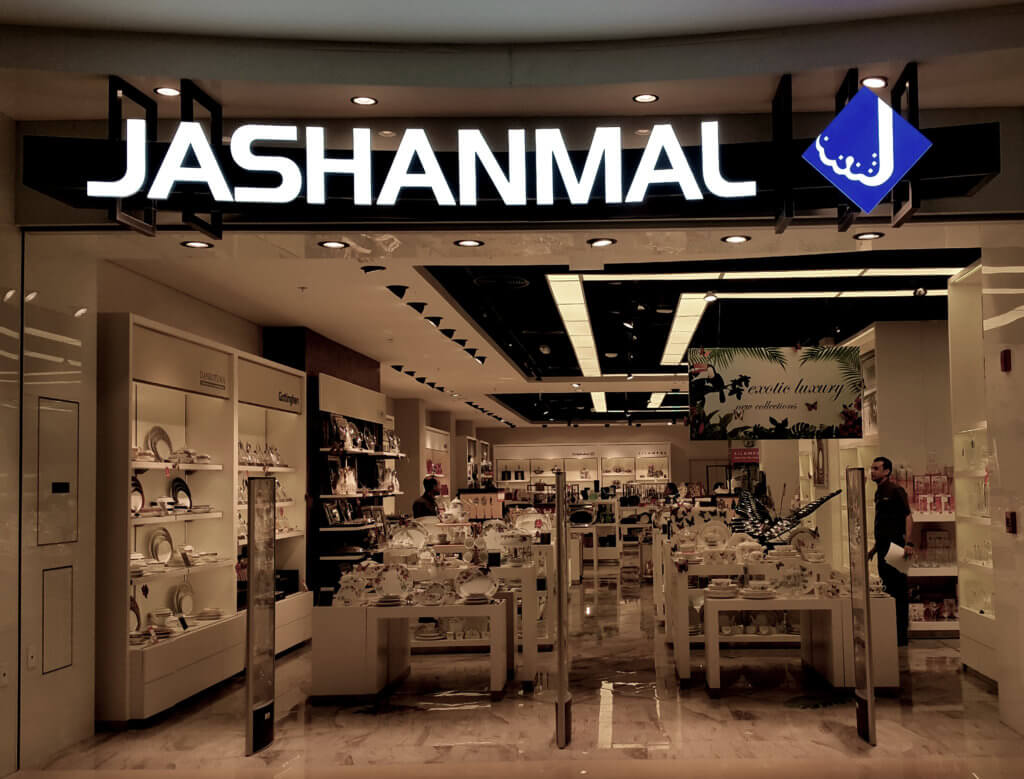With 100 years of history and over 100 stores in the UAE, Kuwait, Bahrain and Oman, the name Jashanmal has become synonymous with retail and wholesale in the region. The Jashanmal Group’s journey began as so many entrepreneurial success stories do: with a leap of faith.
Anticipating the economic potential and needs of British interests in the Middle East, the late Rao Sahib Jashanmal moved from his home in Karachi, in present-day Pakistan, to Basra, Iraq. In 1919, he founded the first Jashanmal store, which sold books catered to the then consumer. Soon, his son Naraindas joined him in the business. They diversified their products and internationalised, following growth markets like Bahrain and then Kuwait in 1935. In 1956, the Jashanmal Group opened its first department store in the UAE where, eventually, members of the Jashanmal family would relocate to further increase their focus on the Arabian Peninsula.
Aside from a penchant for seeing past borders and an affinity for building relationships, the Jashanmal family shares unwavering flexibility in the face of disruption – geographical or otherwise. Their business is built on a culture of customer satisfaction, the courage to follow entrepreneurial intuition and an appreciation for professionalism.
Shafali Jashanmal, a third-generation family member, reflects on this legacy through the lens of her new business, Selvatika Foods, which currently distributes a speciality Colombian coffee – Amor Perfecto -throughout the Middle East. Shafali, along with her partner, Marcela Saouda, hopes to expand to other food products as the business grows. Coming from a family of entrepreneurs, Shafali looks forward with the global perspective that increasingly defines next-generation immigrant family business owners.
We sat down with Shafali to talk about generational differences, whether entrepreneurship is intrinsic or acquired and the flexible concept of “home”.
“My grandfather built long-term relationships and garnered respect by dedicating himself to others and to his profession.”
How does the scope of your grandfather’s accomplishments as an immigrant impact you and your work?
The story of my grandfather featured prominently in my childhood, but unfortunately, he‘d passed away before I could meet him. To us, he was always spoken of in terms of his values as a human being and how much he valued his interactions with others. My grandfather built long-term relationships and garnered respect by dedicating himself to others and to his profession.
It’s a way of being that I think about more so now that I have started my own business, especially when I consider the challenges my grandfather overcame as an immigrant to the Middle East. He did it all without a support system. The confidence he showed on his journey is an inspiration.
Doubtless, his legacy and the family entrepreneurial spirit informed my decision to start a business.
Is this entrepreneurial essence learned or inherited – nurture or nature?
It’s both. Take my cousins for example, who, incidentally, live in different parts of the world, and yet are also entrepreneurial in their own right. In my immediate family, we have all taken some type of entrepreneurial risk in our respective ventures.
Nature might also be part of that desire. However, we were also encouraged to believe in ourselves and were provided the tools to take informed decisions toward executing our own ideas. The tools we were given is a supportive and honest family, aneducation and exposure, early in life, to a global view of the world. This level of positive reinforcement translates well into entrepreneurship because it enables the tolerance of failure, and failure is unavoidable on the path to personal and entrepreneurial growth. A nurturing environment manifests confidence and prepares people for taking risks.
Are second- and third-generation immigrant entrepreneurs motivated by the same survival instinct, or is it something else?
Jashanmals as a company was already established, when my father’s generation came to work, but he and his brothers were still driven by the need to grow the business and keep it alive.
We’re fortunate to enjoy comforts that my father’s generation didn’t have. We no longer have to think about survival in the way that they needed to, we live in a different time. Some of us, including myself, worked for a period of time in the business, and then went on to pursue our goals independently. But we never lost that sense of community or contribution to the family business.
[ms-protect-content id=”4069,4129″]
“Identity is something entirely different for this generation. They see themselves as global citizens…”
What impact do you feel your family’s success will have on the next generation?
Both my generation and the generation that comes next exist at an exciting juncture. Unlike many South Asian families that I’ve met who maintain a presence in their home country, my immediate family embraced the Middle East as our primary home and residence. I have not spent much time in India over the years, and grew up in the Gulf, studying the language of English and Arabic alongside my immediate family members.
I was taught that home is not a strictly physical place. Instead, home is the community of people and relationships you create.
The next generation will have an even more global perspective. They move around more and are exposed to an even greater diversity of cultures. The UAE is a good example of this global diversity with so many nationalities living peacefully in one country.
Identity is something entirely different for this generation. They see themselves as global citizens, and live in the present, with all its various influences. Business families are adapting to this notion to survive in a world where nationality slowly becomes less relevant and commonality is based on other factors. Going back to what my father always says: it’s about human values, irrespective of origin.
Is this shift making immigration easier?
Even though migration is becoming easier in certain ways – physically, for example – it still requires courage and can be emotionally challenging. After many years in the Gulf, my grandfather eventually returned to India to retire.
Nowadays, neither myself nor my immediate family feels like immigrants. We feel connected to the Middle East because we grew up here, built our friendships, relationships and businesses here, and realise this as the home of family generations to come.
Does Jashanmal have plans to follow further geographical expansion?
The company has survived and thrived for 100 years, and I am confident that the management team will take the company forward, making the right strategic and operational decisions that allow resilience and drive expansion.
That said, the Gulf’s our base now, and we are glad to be here. Being part of the UAE’s international community has given us an entrepreneurial advantage. We attended a school where our classmates were from all over the world. As a result, we saw the importance of communication and building relationships at a young age. We learned to accommodate difference, which has been hugely beneficial because, at the end of the day, business is about fostering relationships. Regardless of where we go, the significance of growing together within a community will not change.
[/ms-protect-content]

